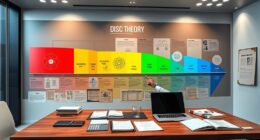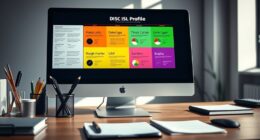To dominate your interview, start by asking about the company culture and team dynamics. This helps you gauge if you'll fit in. Next, clarify the specific daily responsibilities to align your strengths with the role. Inquire about key skills for success and how performance will be measured. Don't forget to explore feedback mechanisms and potential career advancement opportunities. These questions show your seriousness and align your expectations with the company's goals. By adopting this approach, you'll position yourself as a strong candidate. There's always more to uncover about making a lasting impression in your next interview.
Key Takeaways
- Ask about company culture to understand values and environment, ensuring alignment with your expectations and work style.
- Inquire about daily responsibilities to clarify expectations and identify key projects where you can contribute effectively.
- Explore performance measurement criteria to align your skills with the company's success metrics and understand how your contributions will be evaluated.
- Request information on training and development opportunities, highlighting the organization's commitment to employee growth and retention.
- Discuss feedback mechanisms to understand how the company supports continuous improvement and values employee input in the workplace.
Understanding the Company

When preparing for an interview, understanding the company is essential to your success. You'll want to dig into the company culture, values, and environment. Ask yourself what makes this workplace unique.
Consider what the best parts of working there are and how employees thrive in their environment. Understanding the personality types that excel can help you gauge if you'd fit in.
Don't overlook team dynamics. Find out what team-building activities they organize and how often meetings occur. An open-door policy might indicate a collaborative atmosphere. Additionally, a positive response to questions about employee retention can signal a strong company culture and workplace satisfaction.
Also, consider how employees interact daily and whether social events foster camaraderie.
Professional development is another key component. Investigate how the company supports continuing education and career growth opportunities. Knowing if there's a clear path for advancement can guide your long-term goals.
Finally, adaptability and work style matter. Ask how employees handle change and the policies on flexible hours. Understanding the prevalent communication style will help you assess whether you'll feel comfortable.
Clarifying the Role

To clarify the role, you need to pinpoint the daily responsibilities and understand what success looks like in this position.
Ask about the key skills required to excel and how performance will be measured over time. Role clarification can significantly reduce turnover rates and improve retention, ensuring that you make an informed decision about your fit for the role. Additionally, understanding the divorce statistics can help frame your approach to managing stress during transitions. This information will help you assess whether the role aligns with your strengths and career goals.
Daily Responsibilities Overview
Understanding daily responsibilities is essential for ensuring a smooth shift into any new role. Start by asking for a detailed description of the daily tasks and responsibilities. This way, you can better understand what a typical workday will entail and avoid any surprises. Align these responsibilities with the job posting to confirm that they match your expectations. Provide examples from your current or previous positions to demonstrate your experience with similar tasks.
Next, focus on the key projects and tasks. Identify the most significant projects and explain your role in them, highlighting any achievements that had an impact on the company. Demonstrating knowledge of responsibilities can help illustrate how your past experiences align with the needs of the new role.
Inquire about the team and organizational structure to understand how your role fits within the broader context. This information will help clarify team dynamics and how you'll interact with others.
Additionally, clarify available resources, decision-making processes, and how accountability is maintained. Understanding how tasks are prioritized, especially during tight deadlines, will also aid your shift.
Success Measurement Criteria
Clarifying success measurement criteria is vital for ensuring that you meet the expectations of your new role. To define success effectively, you should focus on specific goals that are SMART—Specific, Measurable, Attainable, Relevant, and Timely. Success should also be outcome-based, meaning you'll evaluate if your efforts positively impacted the company and its stakeholders. Additionally, understanding the importance of candidate satisfaction can provide valuable insights into your performance and how it aligns with company objectives.
Here's a quick reference table to help you visualize these criteria:
| Criteria | Description | Example |
|---|---|---|
| Specific Goals | Goals should be clear and achievable | Increase sales by 20% in Q2 |
| Personal Standards | Set personal benchmarks higher than job expectations | Complete a professional certification |
| Continuous Improvement | Endeavor for ongoing growth and development | Attend monthly training sessions |
Aligning your personal definitions of success with the job expectations is essential. Remember to regularly assess your performance using Key Performance Indicators (KPIs) and gather feedback to make necessary adjustments. By focusing on these aspects, you'll not only meet but potentially exceed the role's requirements.
Key Skills Required
Identifying key skills required for the role is essential for making a strong impression during your interview. Start by thoroughly researching the company to understand its mission and values. This will help you align your skills with their needs.
Review the job description carefully and match your experiences to the specific requirements. Prepare answers to common interview questions relevant to your field, ensuring you articulate your thoughts clearly. Anticipate common questions that may arise based on the job posting to further enhance your preparedness.
Effective communication is vital. Practice your verbal skills to be articulate and confident. Non-verbal cues, like maintaining eye contact and using appropriate body language, also matter. Engage in active listening to fully grasp the interviewer's questions and comments, showing your enthusiasm for the role.
Confidence and calmness can set you apart. Manage any nerves to keep a composed demeanor, speaking slowly and thoughtfully. Highlight your past experiences and how they relate to the job.
Be ready to provide specific examples of your skills and achievements, emphasizing how they can benefit the company. By clearly relating your capabilities to the role, you'll demonstrate that you're the right fit for the position.
Exploring Team Dynamics

Team dynamics play an essential role in determining how effectively a group collaborates and achieves its goals. Understanding these dynamics will help you navigate challenges and foster a productive environment. Here's how to evaluate and enhance your team collaboration:
| Key Aspect | Strategies to Implement | Expected Outcomes |
|---|---|---|
| Group Project Experience | Share your role, achievements, and outcomes. | Demonstrates capability and impact. |
| Input from Outside Employees | Create feedback loops and regular check-ins. | Guarantees timely and relevant information. |
| Conflict Resolution | Address issues openly and seek common ground. | Builds trust and improves relationships. |
| Learning from Failure | Analyze what went wrong and share lessons learned. | Promotes growth and resilience. |
When you face a lack of contribution from a team member, directly address the issue with constructive feedback. This encourages accountability and enhances performance. If team members clash due to different opinions, facilitate a discussion to resolve misunderstandings. By focusing on collaboration, you can maintain motivation and engagement, even during tight deadlines. Embracing diverse perspectives will lead to innovative solutions and a stronger team dynamic overall. Additionally, fostering strong teamwork skills is essential as it improves not just performance but also the overall morale of the group.
Setting Expectations

When you set clear expectations during the interview process, you not only align job requirements with candidate skills but also create a foundation for success. Clearly outlining the job responsibilities, performance goals, and company culture helps prevent misunderstandings.
Make certain candidates know what skills and qualifications are essential for the role. This clarity enables them to prepare effectively and showcase their relevant experiences. Additionally, understanding the importance of strong communication skills can significantly enhance the candidate's ability to express their qualifications.
During the interview, reiterate these expectations and describe what a typical day looks like for someone in that position. Use examples from previous projects to illustrate the role's demands. This approach guarantees that both you and the candidate are on the same page, minimizing the chance of misalignment. Additionally, clear expectations provide a framework for evaluating candidates, ensuring that you make informed hiring decisions.
Furthermore, provide candidates with the opportunity to ask questions. This not only clarifies their understanding but also gives you insights into their preparedness and interest in the role.
Evaluating Feedback Mechanisms

Effective feedback mechanisms are vital for fostering a culture of continuous improvement within an organization. To evaluate these mechanisms, start by defining clear objectives and criteria that align with your organization's goals. Identify specific performance metrics, both quantitative and qualitative, such as customer satisfaction or employee engagement, guaranteeing they're relevant to your business needs. Effective feedback mechanisms can significantly enhance employee engagement and motivation, leading to a more dynamic workplace.
Collecting and analyzing feedback data is essential. Use various data collection methods like surveys or interviews, and gather feedback regularly through pulse checks or post-training surveys. Analyze the data to spot trends and derive actionable insights that can drive improvement.
When providing feedback, timing is key. Make sure you deliver feedback close to the relevant event and keep it clear and concise. Balance positive feedback with constructive criticism to motivate and guide employees effectively. Additionally, maintain confidentiality in feedback processes to encourage honesty.
Finally, develop an action plan based on the feedback received and monitor progress. Regularly revisit feedback to track improvements and show employees that their input leads to tangible changes. By closing the feedback loop, you reinforce the value of their contributions, enhancing engagement and performance.
Future Growth Opportunities

When considering future growth opportunities, think about the clear paths for career advancement within the company. You'll find training and development programs designed to enhance your skills while fostering interdepartmental collaboration. Understanding these elements can help you align your ambitions with the company's goals. Additionally, developing new skills through ongoing education is crucial for staying competitive in your field. Furthermore, pursuing relevant certifications such as ISTQB can significantly enhance your credibility and job prospects in the competitive SQA landscape.
Career Advancement Paths
Steering your career advancement paths is essential for achieving long-term success and fulfilling your professional ambitions. Start by enhancing your qualifications through education; consider earning a bachelor's or master's degree, which can open doors to advanced opportunities. Continuous learning is vital for staying competitive in the job market, so don't hesitate to pursue professional certifications that play a key role in broadening your skills and visibility in your field. Investigate possible employer reimbursement options for educational expenses to ease financial burdens.
Networking is another vital element. Attend events and join professional associations to build connections that can lead to job opportunities and industry insights. Seek out mentors who can guide you and sponsors who can advocate for your advancement.
Don't overlook internal and lateral moves within your organization. Use performance reviews to express your readiness for leadership roles or explore new responsibilities. Job shadowing can also provide valuable insight into other positions.
Lastly, gain experience through internships, volunteer work, or presentations. This not only enhances your skill set but also showcases your capabilities to potential employers.
Training and Development Programs
Investing in training and development programs can greatly enhance your career growth and the overall efficiency of your organization.
By participating in these programs, you not only improve your skills and knowledge to keep pace with industry changes but also boost your confidence and productivity. This investment reduces wastage and accidents, promoting a safer work environment. Additionally, it helps maintain a competitive advantage in the market by aligning your skills with the latest industry advancements. Furthermore, engaging in such programs contributes to continuous learning, essential for adapting to evolving job demands.
In addition, it shows that you're valued and supported, which can greatly improve morale.
Consider the following benefits of training and development:
- Increased Employee Retention: Employees are more likely to stay when they see opportunities for growth.
- Enhanced Engagement: Feeling valued leads to higher job satisfaction and motivation.
- Promotes Internal Advancement: Training prepares you for higher responsibilities within the company.
- Fosters Innovation: Developing new skills supports creativity and process improvements.
Interdepartmental Collaboration Opportunities
Interdepartmental collaboration opens up a wealth of future growth opportunities for both individuals and the organization. By enhancing communication and understanding, you facilitate the exchange of ideas, guaranteeing everyone aligns with the same goals. Improved communication channels break down barriers, saving time and preventing misunderstandings. This collaborative spirit fosters mutual respect and trust among employees.
Moreover, bringing together diverse perspectives boosts innovation and creativity. When different skills and experiences collide, you're more likely to tackle complex challenges and generate fresh ideas. This flexibility enhances your ability to anticipate risks, leading to superior innovation performance. High cultural intelligence (CQ) among team members further amplifies the benefits of collaboration by allowing for better adaptation to different cultural contexts.
Streamlined decision-making processes are another key benefit. By eliminating redundancies and utilizing resources more effectively, you increase efficiency and reduce project delays. Sharing best practices guarantees informed decisions, boosting risk management.
Finally, interdepartmental collaboration considerably improves employee morale and job satisfaction. You gain a sense of belonging and inclusion, which leads to higher engagement. Exposure to new challenges through cross-department projects enriches your learning experience and fosters a positive work environment.
Embrace these collaboration opportunities to enhance your growth trajectory and contribute meaningfully to your organization's success.
Frequently Asked Questions
What Is the Company's Approach to Work-Life Balance?
When you ask about the company's approach to work-life balance, look for flexible leave policies and options like unlimited PTO.
You'll want to hear about family-friendly benefits, such as paid parental leave and on-site childcare.
Pay attention to their work arrangements—do they offer telecommuting and flexible schedules?
A supportive culture that values your personal time, along with clear boundaries around work hours, can greatly enhance your overall job satisfaction.
How Does the Company Celebrate Employee Achievements?
When it comes to shining a light on employee accomplishments, you'll find the company embraces a delightful array of celebrations.
You might enjoy a catered team lunch or receive a heartfelt handwritten note of gratitude.
Picture yourself being recognized in a company-wide email or even at an office party.
With opportunities for bonuses and extra time off, you'll feel valued and motivated to continue achieving great things alongside your colleagues.
Are There Any Unique Employee Benefits Offered?
Yes, there are some unique employee benefits offered.
You'll enjoy a gym membership reimbursement, free health trackers, and a smoking cessation program with incentives.
Additionally, you'll appreciate flexible work options like Summer Fridays and unlimited vacation.
If you're a parent, the childcare reimbursement and paid parental leave will be valuable.
Plus, financial support, like student loan debt assistance, shows the company's commitment to your well-being both personally and professionally.
What Is the Company's Stance on Diversity and Inclusion?
Understanding a company's stance on diversity and inclusion is like peering through a window into its culture.
You'll find that this organization is committed to fostering an equitable and inclusive workplace, with policies that support diverse backgrounds and abilities. They actively promote a culture of belonging, offer regular training, and maintain accountability through feedback.
You'll also notice their recruitment practices aim to eliminate bias and create a diverse candidate pool, ensuring everyone feels valued.
How Does the Company Handle Remote Work Arrangements?
When you ask how the company handles remote work arrangements, you'll uncover valuable insights.
You might hear about their flexibility, like hybrid options or fully remote roles. They could share statistics on employee preferences, revealing how many work remotely or the productivity benefits they've noticed.
Understanding their stance will help you gauge if their remote culture aligns with your work style and if you'll thrive in that environment.
Conclusion
By asking the right questions during your interview, you not only demonstrate your interest but also guarantee the role aligns with your career goals. Did you know that candidates who engage with thoughtful questions are 68% more likely to receive a job offer? So, take the time to understand the company, clarify the role, and explore team dynamics. Doing so will empower you to make informed decisions and set yourself up for success in your new position.
Emmeline is the backbone of our content creation team, bringing complex psychological concepts to life with clarity and empathy. As our Expert Writer, she crafts engaging, insightful articles that guide readers through the intricacies of personality assessments and what they reveal about the human condition. Her passion for psychology and personal development shines through in every piece she writes.










